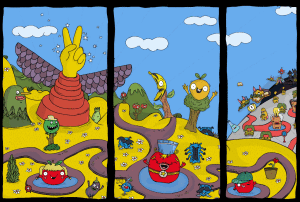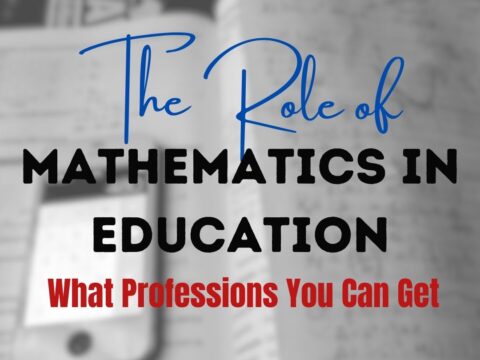Most elementary age kids I know love math, but that changes when they matriculate to middle school. If you ask seventh and eighth graders what their hardest subject is, they’ll hands down tell you it’s math. And that opinion doesn’t improve in high school. In fact, Forbes reported that 82% of public high schoolers in the well-to-do Montgomery County Maryland failed Algebra. US News blamed math knowledge for a 33% failure rate by Oklahoma high school seniors on their exit exams.
To turn those numbers around, parents and teachers alike are looking to technology. This goes well beyond Khan Academy’s online video training, into fantasy worlds of trolls and wizards, the type of activities most parents have tried to keep their kids away from. Now, they want to use their kids’ native interest in online gaming to scaffold math knowledge. Here are three wildly-popular choices that have made kids choose math practice for their free time:
 Dimension U
Dimension U
Fee or subscription
DimensionU is a collection of engaging interactive multiplayer fantasy games for grades 2-10 (some can be played solo) that focus on core skills in mathematics and literacy. Content aligns with Common Core, state standards and classroom instruction. Each game is designed with unique features to bring out distinct academic and strategic skills in students.
Dimension U is much closer to typical gaming than the usual math education fare, including edgy avatars, mystical journeys, and leaderboards. It’s a little-known gem in the ed tech field. Not surprisingly, Dimension U’s awards have spanned a decade, including several Codies, MacWorld Editor’s Choice, a Stanford Summit commendation, accolades from EdNet and Edtech, Computers for Youth, and about six more. Click the link for more detail.
Pros
Not only does Dimension U offer online games (iOS and Web), but several can be downloaded and played on computers (Mac or PC). In a world where teachers still suffer too often from tech failures, this is a welcome change.
Schools using Dimension U report high improvement in student math scores, often in excess of 33%.
Con–which became a Pro
I couldn’t find a lot of current information about these games. Most of the links were a couple of years old. That changed markedly when I stumbled on a news story about annual virtual math competitions sponsored by Dimension U in conjunction with partners like the Department of Defense. These were covered by all major news networks including Fox, ABC, NBC, and others. Watching the kids’ enthusiasm for finding math answers so their team could win energized me as a teacher.
Educational Applications
Dimension U makes it easy to differentiate for student needs and abilities through the detailed settings and wide variety of games offered. Though this review focuses on math, Dimension U also offers games for Literacy and Science.
With a school subscription, you can set up private game rooms just for your students. These are great for safe, user-friendly multiplayer action. Here’s more about that in their online brochure.
One more interesting point: All the math is done in the students’ heads–no pencil and paper!
Land of Venn
Created by iMagine Machine for iOS and Android, in this app, kindergarten through third graders use their knowledge of geometry to stop the Evil Bookenriders from destroying the Land of Venn. To do this, players move through thirty increasingly difficult levels, becoming familiar with geometric shapes, square roots, lines, points, hierarchical relationships, and more. Players start as novices and rise through levels to become a Wizard powerful enough to defend the homeland.
Land of Venn is easy to use, with no learning curve. Content is age-appropriate, presented in an enticing manner that is irresistible to most children. Kids love the crazy characters with their funny voices, the colorful graphics, and the humor that is woven throughout the gameplay.
Pros
Land of Venn simulates the way children initially learn from parents: by imitation, play and conversation.
No advertising, no in-app purchases, no personal information collected. Excellent.
Cons
Starts out almost too easy, but quickly becomes more challenging. My fear: Some kids will give up, thinking there is no challenge.
Educational Applications
Besides the formal understanding, the game aims at developing skills in pattern recognition, real-time situation analysis and the creation and use of geometric shapes to solve problems.
It’s aligned with Common Core State Standards and covers a majority of first-fourth grade geometry.
ProdigyGame.com
Free (fee upgrade to Premium)
Prodigy is a free, adaptive math game for grades 1-7 that integrates Common Core or Ontario math into a role-playing game using a Pokemon-style wizardry theme. Students complete math questions to level up (become more powerful) and ultimately defeat Crios, Prodigy’s main antagonist.
Based on the student’s profile and an invisible diagnostic run during the preliminary tutorial, students are placed at a starting math level. As they play, question difficulty increases or decreases depending upon their answers and facility with the skills. If a student struggles with a concept, following questions will backfill the necessary skills.
As the student works through the math problems, many lessons (but not all) include virtual manipulatives to help solve the problem. These include a speaker to say the question, a hint button to provide help, detail on the required skill, and a drawing tool to work through the answer. These encourage students to build their own problem solutions in a way that works for them rather than relying on a teacher or parent.
Pros
I like that the site offers prepared parent letters to save teacher time and get parent buy-in for this game-based math program. The letters do a great job of sharing the purpose of the Prodigy math site and explaining how parents can get involved in learning.
I like that the site reminds students NOT to use their real name when creating their avatar and why.
Teachers don’t have to be experts to have students use this game (as opposed to Minecraft where it really helps if the teacher knows what’s going on).
Cons
The push for Pro features comes early in the game. It’s not onerous and easily avoided. I’m not sure I’d even notice it after extended play. Since the price is over $50 a year, I was pleased that being a premium member had no impact on the educational value of the game.
Educational Applications
The teacher dashboard provides thorough reports on which students are practicing what math skill and how well they are doing.
Math skills addressed in assignments can be timed to appear exactly when those topics are covered in class and disappear when those lessons are over. Students have no overt knowledge of what those skills are because they are invisibly integrated into the game play. They learn the math as they play and cannot progress until it is mastered. Because of this, the game play can be used for both formative and summative assessments.
Conclusion
I can’t rank these three. They’re all great. Offer one for each grade level, or per semester, or mold an after-school math club around them. They are absolutely top-notch and a great way to put the wonder back into math.
Jacqui Murray has been teaching K-18 technology for 30 years. She is the editor/author of over a hundred tech ed resources including a K-12 technology curriculum, K-8 keyboard curriculum, K-8 Digital Citizenship curriculum. She is an adjunct professor in tech ed, Master Teacher, webmaster for four blogs, an Amazon Vine Voice, CSTA presentation reviewer, freelance journalist on tech ed topics, contributor to NEA Today, and author of the tech thrillers, To Hunt a Sub and Twenty-four Days. You can find her resources at Structured Learning.






































We created a physical gamify learning experience with math. The kids love it and so do we, the parents! Google “Gamify Learning Math Bundle” Its made by jump2math.
Thanks for sharing that. Do you have a link?